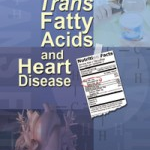Synthetic trans-fatty acids have been restricted in several NY State counties since 2007. Now a new study says it was a good move, since that restriction was responsible for a greater decrease in the hospital admissions for heart attack and stroke than occurred in unrestricted counties. We're not so sure, however, it's really that straightforward.
trans fatty acids
Could it be: saturated fat unproven as heart risk? What s next: drugs and alcohol also OK? Not what momma told us!
The recent addition of trans fat information to the Nutrition Facts labels on food products, combined with news media reports and activists warnings, have brought these fats to the forefront of public concern.
In a national survey conducted in November 2005, 81 percent of a representative sample of U.S. consumers reported being aware of trans fats, and 54 percent indicated that they were trying to decrease their trans fat consumption (IFIC Foundation, 2006).
Putting the role of trans fatty acids (TFAs) into perspective can be difficult, both because of the intensity of the rhetoric surrounding them and because of widely varying claims about the extent of the health risk they pose.
In its latest attempt to scare consumers and drum up publicity for itself, the Center for Science in the Public Interest is now warning that the trans fatty acids found in French fries, fried chicken and many other foods may cause heart attacks.
"It's been a whole week since the CSPI held a press conference to demonize a food ingredient*, so they were obviously overdue for another one," says Dr. Elizabeth Whelan, president of the American Council on Science and Health. "As usual, these champion food terrorists have plucked a few facts out of context, heated them to the distortion point and created a soufflé consisting largely of hot air."

